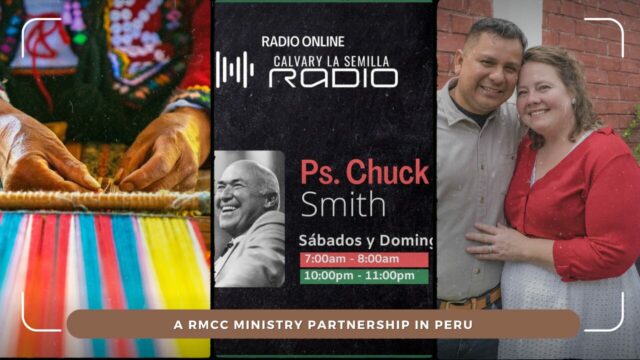
Taste and See God’s Goodness: The Jackson Willms Story
As I glanced out the front window and watched Jackson Willms and his care aide make their way up the...
Join us online at 9:00 am and 11:00 am Watch Online

The world tells us we can do it all. Try hard enough, work enough hours, do all the right things and you can achieve anything. Words like “limitless” and “hustle” pervade media messaging and lay the groundwork for lives of endless striving.
“You’re not a robot,” I regularly tell my husband who, like me, struggles to accept that God designed our bodies with limitations. This reality hit me hard a decade ago when I was forced to spend nearly two months on bed rest after years of living with utter disregard for God’s command to rest.
During my two-year recovery, I adjusted my routines to account for my humanity, acknowledging that I’m not superhuman and simply cannot do it all. I realized that just because an activity is good doesn’t mean it’s God’s will for me. I asked the Lord for discernment to help me manage my time, steward my body, and order my days according to His will. I asked Him to teach me how to cease striving and embrace rest.
As always, God’s Word provided what I needed—a simple explanation of God’s will for my life and how to spend my days. Throughout the New Testament, love is described as a non-negotiable, defining characteristic of the Christian life (i.e., 1 John). John tells us that we love God by keeping His commandments (John 14:15), and God’s commandments are summed up in the command to love others (Matthew 22:37–40).
The thing is that it’s precisely because of my love for others that I often overcommit and find myself running on empty. Sometimes it feels like I love too many people—more than I can handle. And the truth is that some people are legitimately difficult to love. Anyone can love someone who’s easy to love, but as disciples of Christ, we’re called to a higher love, a better love. Jesus told us to love our enemies (Luke 6:27–36)!
After pondering all this “love stuff” for years, I did a double-take when I read 1 John 5:3, which says that “[God’s] commandments are not burdensome.” Honestly, sometimes I find loving others burdensome. So when I read this verse, I questioned the Lord, “How is it possible to walk in love day in and day out without finding it burdensome? What am I missing?”
God’s answer to me began in Matthew 11:29–30 where Jesus said, “Take My yoke upon you and learn from Me, for I am gentle and lowly in heart, and you will find rest for your souls. For My yoke is easy and My burden is light.” Jesus tells us that, from Him, we can learn how to experience rest for our souls while walking in love according to His Word.
Throughout His earthly ministry, we see Jesus constantly in demand. He was a busy man, doing what God called Him to do. His disciples wanted to be with Him and wanted Him to teach them. Crowds followed Him everywhere. Sick people wanted His healing. Hungry people wanted Him to feed them. It sounds a lot like our own lives, doesn’t it? There’s always something to do because there’s always someone with a need.
Jesus was fully God, but He was also fully man in a physical human body, so He had needs like us. He experienced hunger, tiredness, pain, and temptation, like we do. So how did He keep going? How did He handle the constant demands and continue to selflessly serve and love others?
Jesus’ ministry came from—started with and was powered by—His intimacy with His Father. Throughout His day—and even sometimes throughout His night—Jesus was in continual communion with God. He prayed:
Think about this. Jesus was truly man, yet He lived a perfect life and never sinned. He was truly God—all-powerful and all-knowing. Still, He prayed. God’s Son, Jesus, humbly sought communion with the Father because He depended on the Father to live according to God’s will. He needed God’s help.
How much more necessary is it for us imperfect, sinful human beings to cultivate the discipline of prayer?
Jesus loved others well because He was empowered by the Father’s love. His relationship with God was the foundation and motivation behind His earthly ministry. In the same way, we are motivated and empowered to love others well by receiving God’s love for us. As it says in 1 John 4:19, ”We love because He first loved us.”
And God proved His love for us “in that, while we were still sinners, Christ died for us (Romans 5:8).” He did this because He desires a relationship with us, and that relationship is nurtured through prayer.
I live this out imperfectly, but I now understand the necessity of prayer if I want to love Jesus and others faithfully. When I prioritize my relationship with Jesus Christ by communing with Him through His Word and in prayer, loving others doesn’t feel like a burdensome, never-ending task list. Instead of exhausting labour, my love and service for others become a joyful, willing response to God’s love for me.

As I glanced out the front window and watched Jackson Willms and his care aide make their way up the...

Several years ago, Pastor Blair Butterfield was at a pastors’ conference in Lima, Peru where he bumped into a man...

When I was a child I feared not being liked. When I was older, I feared losing the popularity I...